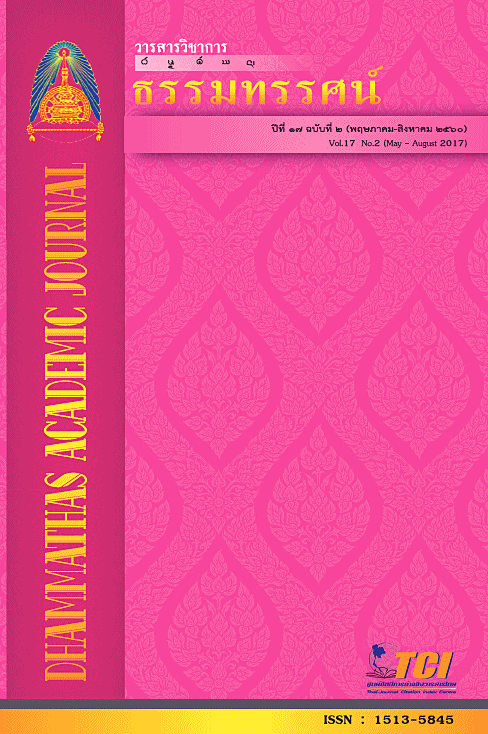เจตนาดี กับหน้าที่ในชูชกกัณฑ์ ตามทัศนะของอิมมานูเอล ค้านท์
Main Article Content
Abstract
บทคัดย่อ
หน้าที่ของบุคคลในพระเวสสันดรชาดก กัณฑ์ชูชกพระไตรปิฎก เล่มที่ ๒๘ ขุททกนิกายชาดก ภาค ๒ ในมุมมองแนวคิดเรื่องกฎศีลธรรม (เจตนาดี) ของอิมมานูเอล ค้านท์ ผู้เขียนได้ทำการแบ่งหน้าที่ของบุคคลออก เพื่อทำการศึกษาวิเคราะห์ ๔ หน้าที่ ดังนี้ ๑) หน้าที่มารดาบิดาของนางอมิตตตา๒) หน้าที่ของนางอมิตตตา ๓) หน้าที่ของพราหมณ์ชูชก และ ๔) หน้าที่ของนายพรานเจตบุตร เมื่อวิเคราะห์การกระท????ำหน้าที่ทั้ง ๔ ตามแนวคิดเรื่องกฎศีลธรรมของค้านท์ (เจตนาดี)แล้วสรุปได้ ๓ ประเด็น ดังนี้๑) กระทำหน้าที่ตามกฎศีลธรรมของค้านท์มี ๒ คน คือ นางอมิตตตาและนายพรานเจตบุตร ๒) กระทำหน้าที่ผิดหลักศีลธรรมของค้านคือ ชูชก และ ๓) กระทำหน้าที่ทั้งตามกฎศีลธรรมและผิดกฎศีลธรรมของค้านท์ คือ มารดาบิดาของนางอมิตตตา
Abstract
The duties of each character in Vessantara Jataka are mentioned in Vessantara Jataka, Jujaka Kandha, the Pāli Tripiṭaka Volume 28, Khuddaka-Nikāya Part II. Based on Kant’s perspective on the concepts of the moral principle (goodwill), the author has divided the individual duties into four groups in analysis: 1) parental duties of Amitatā; 2) duties of Amitatā; 3) Jujaka Brahman’s duties; 4) Jettaputta hunter’s duties. After analyzing these four duties’ performance according to Kant’s concepts of the moral principle, it can be concluded into 3 viewpoints: 1) the duties’ performances of Amitatā and Jettaputta hunter comply with Kant’s concept on goodwill; 2) Jujaka Brahman’s duty performance do not comply with that of Kant; 3) parental duties of Amitatā can be analyzed to comply and not comply with that of Kant.

